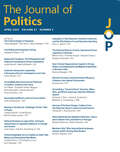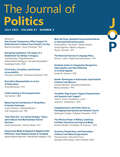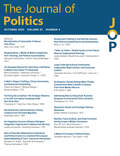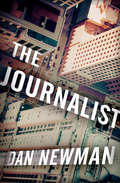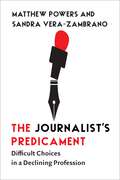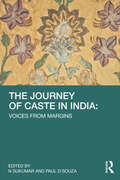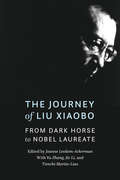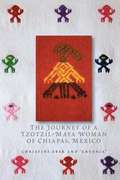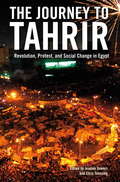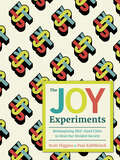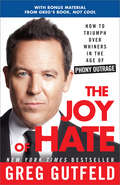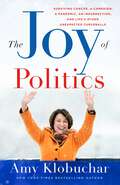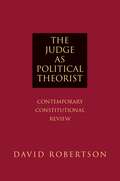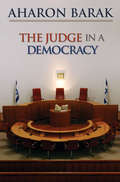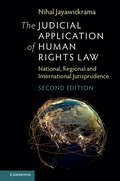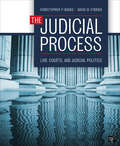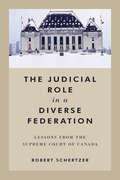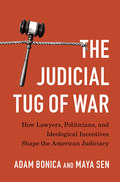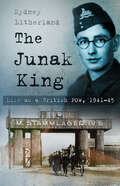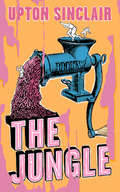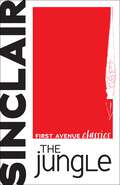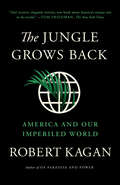- Table View
- List View
The Journal of Politics, volume 87 number 2 (April 2025)
by The Journal of PoliticsThis is volume 87 issue 2 of The Journal of Politics. Established in 1939 and published for the Southern Political Science Association, The Journal of Politics is a leading general-interest journal of political science and the oldest regional political science journal in the United States. The scholarship published in The Journal of Politics is theoretically innovative and methodologically diverse, and comprises a blend of the various intellectual approaches that make up the discipline. The Journal of Politics features balanced treatments of research from scholars around the world, in all subfields of political science including American politics, comparative politics, international relations, political theory, and political methodology.
The Journal of Politics, volume 87 number 3 (July 2025)
by The Journal of PoliticsThis is volume 87 issue 3 of The Journal of Politics. Established in 1939 and published for the Southern Political Science Association, The Journal of Politics is a leading general-interest journal of political science and the oldest regional political science journal in the United States. The scholarship published in The Journal of Politics is theoretically innovative and methodologically diverse, and comprises a blend of the various intellectual approaches that make up the discipline. The Journal of Politics features balanced treatments of research from scholars around the world, in all subfields of political science including American politics, comparative politics, international relations, political theory, and political methodology.
The Journal of Politics, volume 87 number 4 (October 2025)
by The Journal of PoliticsThis is volume 87 issue 4 of The Journal of Politics. Established in 1939 and published for the Southern Political Science Association, The Journal of Politics is a leading general-interest journal of political science and the oldest regional political science journal in the United States. The scholarship published in The Journal of Politics is theoretically innovative and methodologically diverse, and comprises a blend of the various intellectual approaches that make up the discipline. The Journal of Politics features balanced treatments of research from scholars around the world, in all subfields of political science including American politics, comparative politics, international relations, political theory, and political methodology.
The Journalist
by Dan NewmanFor fans of Laura Lippman&’s Tess Monaghan and Jan Burke&’s Irene Kelly series comes a novel of a reporter&’s shadowy past from the author of The Clearing. In the middle of the night, in war-torn Rwanda, journalist Roland Keene leaves his hotel to find armed rebels to interview. Some would call it a suicide mission. Roland wouldn&’t disagree. Though Keene&’s work as a foreign correspondent keeps him on the road—and at arm&’s length from his problems—it doesn&’t stop him from being hounded by the people he betrayed on his way to the front page . . . When Keene started at the bottom, he was living paycheck to paycheck, with no big breaks coming his way. So he decided to make his own. He orchestrated a robbery—one designed to cast himself as the hero—but it went all wrong and turned into a high-profile murder. Despite everything, Keene got a foot in the door of a newsroom. Immersed in the cutthroat world of investigative journalism, he broke another story—this one of citywide corruption—but also started accumulating powerful enemies among his colleagues. Now, with his crimes about to be revealed, Keene has to decide to what lengths he&’ll go to ensure his secrets never see the light of day . . .
The Journalist's Predicament: Difficult Choices in a Declining Profession
by Matthew Powers Sandra Vera-ZambranoLow pay. Uncertain work prospects. Diminished prestige. Why would anyone still want be a journalist? Drawing on in-depth interviews in France and the United States, Matthew Powers and Sandra Vera-Zambrano explore the ways individuals come to believe that journalism is a worthy pursuit—and how that conviction is managed and sometimes dissolves amid the profession’s ongoing upheavals.For many people, journalism represents a job that is interesting and substantial, with opportunities for expression, a sense of self-fulfillment, and a connection to broader social values. By distilling complex ideas, holding the powerful to account, and revealing hidden realities, journalists play a crucial role in helping audiences make sense of the world. Experiences in the profession, though, are often far more disappointing. Many find themselves doing tasks that bear little relation to what attracted them initially or are frustrated by institutions privileging what sells over what informs. The imbalance between the profession’s economic woes and its social importance threatens to erode individuals’ beliefs that journalism remains a worthwhile pursuit. Powers and Vera-Zambrano emphasize that, as with many seemingly individual choices, social factors—class, gender, education, and race—shape how journalists make sense of their profession and whether or not they remain in it.An in-depth story of one profession under pressure, The Journalist’s Predicament uncovers tensions that also confront other socially important jobs like teaching, nursing, and caretaking.
The Journey of Caste in India: Voices from Margins
by N. Sukumar and Paul D’SouzaThis book provides a comprehensive overview of caste in contemporary India. With contributions from scholars like Valerian Rodrigues, B. B. Mohanty, Surinder Jodhka, Anand Teltumbde, etc. It discusses wide-ranging themes like the trajectory of caste in post-independence India; Dalits and cultural identity; the paradox of being a Dalit woman; caste violence and social mobility; Ambedkar’s quest for the right of social equality; social security for inclusive development of Dalits; discrimination and exclusion of Dalits in education; and Dalit merit and institutional injustice, and presents an overview of the struggles for distributive justice in India. This volume will be of importance to scholars and researchers of Dalit studies, social justice, exclusion studies, caste studies, affirmative action, political studies, sociology, social anthropology, and South Asian politics.
The Journey of Caste in India: Voices from Margins
by N. Sukumar and Paul D’SouzaThis book provides a comprehensive overview of caste in contemporary India. With contributions from scholars like Valerian Rodrigues, B.B. Mohanty, Surinder Jodhka, and Anand Teltumbde, it discusses wide-ranging themes like the trajectory of caste in post-independence India; Dalits and cultural identity; the paradox of being a Dalit woman; caste violence and social mobility; Ambedkar’s quest for the right of social equality; social security for the inclusive development of Dalits; discrimination and exclusion of Dalits in education; and Dalit merit and institutional injustice, and presents an overview of the struggles for distributive justice in India.This volume will be of importance to scholars and researchers of Dalit studies, social justice, exclusion studies, caste studies, affirmative action, political studies, sociology, social anthropology, and South Asian politics.
The Journey of Liu Xiaobo: From Dark Horse to Nobel Laureate
by Democratic ChinaAs a fearless poet and prolific essayist and critic, Liu Xiaobo became one of the most important dissident thinkers in the People&’s Republic of China. His nonviolent activism steered the nation&’s prodemocracy currents from Tiananmen Square to support for Tibet and beyond. Liu undertook perhaps his bravest act when he helped draft and gather support for Charter 08, a democratic vision for China that included free elections and the end of the Communist Party&’s monopoly on power. While imprisoned for &“inciting subversion of state power,&” Liu won the 2010 Nobel Peace Prize. He was granted medical parole just weeks before dying of cancer in 2017. The Journey of Liu Xiaobo draws together essays and reflections on the &“Nelson Mandela of China.&” The Dalai Lama, artist and activist Ai Weiwei, and a distinguished list of leading Chinese writers and intellectuals, including Zhang Zuhua, the main drafter of Charter 08, and Liu Xia, the wife of Liu Xiaobo, and noted China scholars, journalists, and political leaders from around the globe, including Yu Ying-shih, Perry Link, Andrew J. Nathan, Marco Rubio, and Chris Smith illuminate Liu&’s journey from his youth and student years, through his indispensable activism, and to his defiant last days. Many of the pieces were written immediately after Liu&’s death, adding to the emotions stirred by his loss. Original and powerful, The Journey of Liu Xiaobo combines memory with insightful analysis to evaluate Liu&’s impact on his era, nation, and the cause of human freedom.
The Journey of a Tzotzil-Maya Woman of Chiapas, Mexico
by Christine Eber AntoniaMost recent books about Chiapas, Mexico, focus on political conflicts and the indigenous movement for human rights at the macro level. None has explored those conflicts and struggles in-depth through an individual woman's life story. The Journey of a Tzotzil-Maya Woman of Chiapas, Mexico now offers that perspective in one woman's own words. Anthropologist Christine Eber met "Antonia" in 1986 and has followed her life's journey ever since. In this book, they recount Antonia's life story and also reflect on challenges and rewards they have experienced in working together, offering insight into the role of friendship in anthropological research, as well as into the transnational movement of solidarity with the indigenous people of Chiapas that began with the Zapatista uprising. Antonia was born in 1962 in San Pedro Chenalhó, a Tzotzil-Maya township in highland Chiapas. Her story begins with memories of childhood and progresses to young adulthood, when Antonia began working with women in her community to form weaving cooperatives while also becoming involved in the Word of God, the progressive Catholic movement known elsewhere as Liberation Theology. In 1994, as a wife and mother of six children, she joined a support base for the Zapatista Army of National Liberation. Recounting her experiences in these three interwoven movements, Antonia offers a vivid and nuanced picture of working for social justice while trying to remain true to her people's traditions.
The Journey to Tahrir
by Chris Toensing Jeannie SowersThe toppling of Hosni Mubarak marked the beginning of a revolutionary restructuring of Egypt's political and social order. Jeannie Sowers and Chris Toensing bring together updated essays from Middle East Report--the premier journal covering the region--that offer unrivaled analysis of the major social and political trends that underpinned these tumultuous events.Starting with the momentous eighteen days of street protest that compelled Mubarak's resignation, the volume moves back in time to plumb the state's strategies of repression and examine the mounting dissent of workers, democracy advocates, anti-war activists, and social and environmental campaigners. Leading analysts of Egypt detail the demographic and economic trends that produced wealth for the few and impoverishment for the many. The collection brings clear-headed, first-hand understanding to bear on a moment of intense hope and uncertainty in the Arab world's most populous nation.
The Joy Experiments: Reimagining Mid-sized Cities to Heal Our Divided Society
by Scott Higgins Paul KalbfleischA new perspective on developing shared joy in urban spaces.Our divided society is quickly reaching crisis level. We are no longer able to sustain social and economic prosperity nor ensure democracy. Fuelling this crisis is a growing sense of social isolation caused by the divisive nature of social media and the decline of infrastructure that used to bring communities together.But there is hope for rebuilding our collaborative society, and it is found in our mid-sized urban areas. These towns and cities offer a scale that can tangibly change the quality of our lives and an intimacy that allows us to influence what our communities can become. Changing cities can change the world!In The Joy Experiments, real estate developer Scott Higgins and creative mind Paul Kalbfleisch use their own mid-sized city-building experiences to present a new way for citizens to engage with their city, and an urban planning strategy that prioritizes infrastructure for the human spirit.
The Joy of Hate: How to Triumph over Whiners in the Age of Phony Outrage
by Greg GutfeldFrom the irreverent star of Fox News's Red Eye and The Five, hilarious observations on the manufactured outrage of an oversensitive, wussified culture.Greg Gutfeld hates artificial tolerance. At the root of every single major political conflict is the annoying coddling Americans must endure of these harebrained liberal hypocrisies. In fact, most of the time liberals uses the mantle of tolerance as a guise for their pathetic intolerance. And what we really need is smart intolerance, or as Gutfeld reminds us, what we used to call common sense.The Joy of Hate tackles this conundrum head on--replacing the idiocy of open-mindness with a shrewd judgmentalism that rejects stupid ideas, notions, and people. With countless examples grabbed from the headlines, Gutfeld provides readers with the enormous tally of what pisses us all off. For example:- The double standard: You can make fun of Christians, but God forbid Muslims. It's okay to call a woman any name imaginable, as long as she's a Republican. And no problem if you're a bigot, as long as you're politically correct about it. - The demonizing of the Tea Party and romanticizing of the Occupy Wall Streeters. - The media who are always offended (see MSNBC lineup)- How critics of Obamacare or illegal immigration are somehow immediately labeled racists. - The endless debate over the Ground Zero Mosque (which Gutfeld planned to open a Muslim gay bar next to). - As well as pretentious music criticism, slow-moving ceiling fans, and snotty restaurant hostesses. Funny and sarcastic to the point of being mean (but in a nice way), The Joy of Hate points out the true jerks in this society and tells them all off.
The Joy of Politics: Surviving Cancer, a Campaign, a Pandemic, an Insurrection, and Life's Other Unexpected Curveballs
by Amy KlobucharAn intimate and revelatory memoir—on personal challenges, political turmoil, and the state of American democracy—from one of the most effective voices in politics, Amy Klobuchar.During the past few years, as our country has faced unprecedented challenges, Senator Klobuchar has been in the room where it happens—on the Senate floor for critical votes during the pandemic, at the debate podium during one of the most critical presidential elections in US history, and in the Capitol on January 6, 2021, when insurrectionists stormed the building, interrupting the certification of the electoral college. It was well past midnight when Klobuchar stood beside then-Vice President Pence to officially certify President Biden's victory.In her candid, honest, and at times bitingly funny memoir, the pragmatic senator shares insider stories from these historic moments, while also inviting readers into her personal life. An underdog in the 2020 Democratic presidential primary campaign, she built surprising early momentum--only to suspend her candidacy in order to support Joe Biden. Within weeks of returning to work in the Senate, the sudden onslaught of COVID-19 hit her family directly. Her husband got very sick and spent a week in the hospital on oxygen and a month in isolation. Klobuchar shares her experience facing a cancer diagnosis while watching her beloved father succumb to Alzheimer's. She recounts the dramatic narrative of January 6 and how close we came to losing our democracy. And, with her signature humor, she reveals what it's like to work with some of her more...well, interesting...colleagues.At the crux of these stories is a narrative of resilience – of personal resilience and the resilience of a nation – and, improbably, joy.
The Judge as Political Theorist: Contemporary Constitutional Review
by David RobertsonThe Judge as Political Theorist examines opinions by constitutional courts in liberal democracies to better understand the logic and nature of constitutional review. David Robertson argues that the constitutional judge's role is nothing like that of the legislator or chief executive, or even the ordinary judge. Rather, constitutional judges spell out to society the implications--on the ground--of the moral and practical commitments embodied in the nation's constitution. Constitutional review, in other words, is a form of applied political theory. Robertson takes an in-depth look at constitutional decision making in Germany, France, the Czech Republic, Poland, Hungary, Canada, and South Africa, with comparisons throughout to the United States, where constitutional review originated. He also tackles perhaps the most vexing problem in constitutional law today--how and when to limit the rights of citizens in order to govern. As traditional institutions of moral authority have lost power, constitutional judges have stepped into the breach, radically altering traditional understandings of what courts can and should do. Robertson demonstrates how constitutions are more than mere founding documents laying down the law of the land, but increasingly have become statements of the values and principles a society seeks to embody. Constitutional judges, in turn, see it as their mission to transform those values into political practice and push for state and society to live up to their ideals.
The Judge in a Democracy
by Aharon BarakWhether examining election outcomes, the legal status of terrorism suspects, or if (or how) people can be sentenced to death, a judge in a modern democracy assumes a role that raises some of the most contentious political issues of our day. But do judges even have a role beyond deciding the disputes before them under law? What are the criteria for judging the justices who write opinions for the United States Supreme Court or constitutional courts in other democracies? These are the questions that one of the world's foremost judges and legal theorists, Aharon Barak, poses in this book. In fluent prose, Barak sets forth a powerful vision of the role of the judge. He argues that this role comprises two central elements beyond dispute resolution: bridging the gap between the law and society, and protecting the constitution and democracy. The former involves balancing the need to adapt the law to social change against the need for stability; the latter, judges' ultimate accountability, not to public opinion or to politicians, but to the "internal morality" of democracy. Barak's vigorous support of "purposive interpretation" (interpreting legal texts--for example, statutes and constitutions--in light of their purpose) contrasts sharply with the influential "originalism" advocated by U.S. Supreme Court Justice Antonin Scalia. As he explores these questions, Barak also traces how supreme courts in major democracies have evolved since World War II, and he guides us through many of his own decisions to show how he has tried to put these principles into action, even under the burden of judging on terrorism.
The Judicial Application of Human Rights Law: National, Regional and International Jurisprudence
by Nihal JayawickramaSince the 1948 Universal Declaration of Human Rights, over 140 countries have incorporated human rights standards into their legal systems: the resulting jurisprudence from diverse cultural traditions brings new dimensions to concepts first articulated in the 1948 Declaration. Nihal Jayawickrama draws on all available sources to encapsulate the judicial interpretation of human rights law in one ambitious, comprehensive volume. Jayawickrama covers the case law of the superior courts of over eighty countries in North America, Europe, Africa, Asia, and the Pacific, and the jurisprudence of the UN Human Rights monitoring bodies, the European Court of Human Rights, and of the Inter-American system. He analyses the judicial application of human rights law to demonstrate empirically the universality of contemporary human rights norms. This definitive compendium will be essential for legal practitioners, government and non-governmental officials, as well as academics and students of both constitutional law and the international law of human rights.
The Judicial Process: Law, Courts, and Judicial Politics
by Christopher P. Banks David M. O′BrienThe Judicial Process: Law, Courts, and Judicial Politics is an all-new, concise yet comprehensive core text that introduces students to the nature and significance of the judicial process in the United States and across the globe. It is social scientific in its approach, situating the role of the courts and their impact on public policy within a strong foundation in legal theory, or political jurisprudence, as well as legal scholarship. Authors Christopher P. Banks and David M. O’Brien do not shy away from the politics of the judicial process, and offer unique insight into cutting-edge and highly relevant issues. In its distinctive boxes, "Contemporary Controversies over Courts" and "In Comparative Perspective," the text examines topics such as the dispute pyramid, the law and morality of same-sex marriages, the "hardball politics" of judicial selection, plea bargaining trends, the right to counsel and "pay as you go" justice, judicial decisions limiting the availability of class actions, constitutional courts in Europe, the judicial role in creating major social change, and the role lawyers, juries and alternative dispute resolution techniques play in the U.S. and throughout the world. Photos, cartoons, charts, and graphs are used throughout the text to facilitate student learning and highlight key aspects of the judicial process.
The Judicial Process: Law, Courts, and Judicial Politics
by Christopher P. Banks David M. O′BrienThe Judicial Process: Law, Courts, and Judicial Politics is an all-new, concise yet comprehensive core text that introduces students to the nature and significance of the judicial process in the United States and across the globe. It is social scientific in its approach, situating the role of the courts and their impact on public policy within a strong foundation in legal theory, or political jurisprudence, as well as legal scholarship. Authors Christopher P. Banks and David M. O’Brien do not shy away from the politics of the judicial process, and offer unique insight into cutting-edge and highly relevant issues. In its distinctive boxes, "Contemporary Controversies over Courts" and "In Comparative Perspective," the text examines topics such as the dispute pyramid, the law and morality of same-sex marriages, the "hardball politics" of judicial selection, plea bargaining trends, the right to counsel and "pay as you go" justice, judicial decisions limiting the availability of class actions, constitutional courts in Europe, the judicial role in creating major social change, and the role lawyers, juries and alternative dispute resolution techniques play in the U.S. and throughout the world. Photos, cartoons, charts, and graphs are used throughout the text to facilitate student learning and highlight key aspects of the judicial process.
The Judicial Role in a Diverse Federation: Lessons from the Supreme Court of Canada
by Robert SchertzerIn The Judicial Role in a Diverse Federation, Robert Schertzer uses the example of the Supreme Court of Canada to examine how apex courts manage diversity and conflict in federal states.Schertzer argues that in a diverse federation where the nature of the federal system is contested the courts should facilitate negotiation between conflicting parties, rather than impose their own vision of the federal system. Drawing on a comprehensive review of the Supreme Court federalism jurisprudence between 1980 and 2010, he demonstrates that the court has increasingly adopted this approach of facilitating negotiation by acknowledging the legitimacy of different understandings of the Canadian federation.This book will be required reading both for those interested in Canada's Supreme Court and for those engaged in broader debates about the use of federalism in multinational states.
The Judicial Tug of War: How Lawyers, Politicians, and Ideological Incentives Shape the American Judiciary (Political Economy of Institutions and Decisions)
by Maya Sen Adam BonicaWhy have conservatives decried 'activist judges'? And why have liberals - and America's powerful legal establishment - emphasized qualifications and experience over ideology? This transformative text tackles these questions with a new framework for thinking about the nation's courts, 'the judicial tug of war', which not only explains current political clashes over America's courts, but also powerfully predicts the composition of courts moving forward. As the text demonstrates through novel quantitative analyses, a greater ideological rift between politicians and legal elites leads politicians to adopt measures that put ideology and politics front and center - for example, judicial elections. On the other hand, ideological closeness between politicians and the legal establishment leads legal elites to have significant influence on the selection of judges. Ultimately, the judicial tug of war makes one point clear: for good or bad, politics are critical to how judges are selected and whose interests they ultimately represent.
The Junak King: Life as a British POW, 1941-45
by Sydney LitherlandSydney Litherland, at the age of 20, was called up in February 1940. After having been evacuated from Greece, he was among the 30,000 British and Commonwealth soldiers taken prisoner by the Germans at the fall of Crete in June 1941. This book documents in fascinating and historically important detail their daily life as POWs in Germany and encapsulates the experiences of tens of thousands of ordinary POWs. The German airborne invasion of Crete and the surrender by the British is still the subject of controversy. Sydney gives here his own first-hand account of the event. This is not an account of heroic escapes and derring-do by dashing officers, but of the day-to-day endurance of the other ranks, mostly very young men, separated from their officers and expected to do hard manual labour in working camps. What is revealed is a different kind of courage: a quiet resilience and dogged determination not just to endure, but to triumph. Supporting each other, they never lose hope of eventual victory or let an opportunity slip to make life more difficult for their captors. This is an enthralling record of their triumphs and tragedies over four long years.
The Jungle
by Upton Sinclair Eric Schlosser Jonathan Beecher Field Ronald GottesmanUpton Sinclair's dramatic and deeply moving story exposed the brutal conditions in the Chicago stockyards at the turn of the nineteenth century and brought into sharp moral focus the appalling odds against which immigrants and other working people struggled for their share of the American dream. Denounced by the conservative press as an un-American libel on the meatpacking industry, the book was championed by more progressive thinkers, including then President Theodore Roosevelt, and was a major catalyst to the passing of the Pure Food and Meat Inspection act, which has tremendous impact to this day.Enriched eBook Features Editor Jonathan Beecher Field provides the following specially commissioned features for this Enriched eBook Classic:* Chronology* Filmography (and the 1914 The Jungle Film Poster)* Early Twentieth-Century Reviews of The Jungle* Suggestions for Further Reading* The Jungle and the Pure Food and Drug Act of 1906* The Jungle Book Cover Designs* Federal Food and Drugs Act of 1906* Immigrants and the Meatpacking Industry, Then and Now* Images of the Chicago Stockyards* Images of Cuts of Beef and Pork* Enriched eBook NotesThe enriched eBook format invites readers to go beyond the pages of these beloved works and gain more insight into the life and times of an author and the period in which the book was originally written for a rich reading experience.
The Jungle (Dover Thrift Editions Series)
by Upton SinclairUpton Sinclair's dramatic and deeply moving story exposed the brutal conditions in the Chicago stockyards at the turn of the nineteenth century and brought into sharp moral focus the apalling odds against which immigrants and other working people struggled for their share of the American dream. Denounced by the conservative press as an un-American libel on the meatpacking industry, The Jungle was championed by more progressive thinkers, including then president Theodore Roosevelt, and was a major catalyst to the passing of the Pure Food and Meat Inspection act, which has tremendous impact to this day.Penguin Random House Canada is proud to bring you classic works of literature in e-book form, with the highest quality production values. Find more today and rediscover books you never knew you loved.
The Jungle (First Avenue Classics ™)
by Upton SinclairJurgis and his family move to Chicago from Lithuania to find a better life. But what they find instead are abysmal working conditions, corrupt legal systems, and chronic poverty. The family gets jobs in Chicago's meatpacking district, Packingtown, and works long hours for low pay. Jurgis is injured on the job and isn't given workers' compensation. His wife is raped by her boss and forced into prostitution. As his family suffers through hardship after hardship, Jurgis wonders if bringing them to America was a huge mistake. First published in 1906, this is an unabridged version of Upton Sinclair's muckraking novel criticizing the exploitation of Chicago's immigrants. The horrifying descriptions of the health violations of the early 20th century meatpacking industry inspired the groundwork legislation for today's Food and Drug Administration.
The Jungle Grows Back: America and Our Imperiled World
by Robert KaganA brilliant and visionary argument for America's role as an enforcer of peace and order throughout the world--and what is likely to happen if we withdraw and focus our attention inward.Recent years have brought deeply disturbing developments around the globe. American sentiment seems to be leaning increasingly toward withdrawal in the face of such disarray. In this powerful, urgent essay, Robert Kagan elucidates the reasons why American withdrawal would be the worst possible response, based as it is on a fundamental and dangerous misreading of the world. Like a jungle that keeps growing back after being cut down, the world has always been full of dangerous actors who, left unchecked, possess the desire and ability to make things worse. Kagan makes clear how the "realist" impulse to recognize our limitations and focus on our failures misunderstands the essential role America has played for decades in keeping the world's worst instability in check. A true realism, he argues, is based on the understanding that the historical norm has always been toward chaos--that the jungle will grow back, if we let it.
